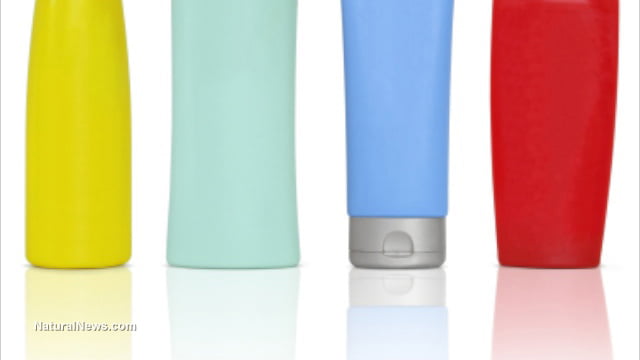
(NaturalNews) Plastic is everywhere nowadays. It is inextricably linked to the fate of our generation and future generations. For decades, different kinds of plastic have made our life so much easier. From food and water storage to building materials. We find it in our houses, children’s toys, mobile phones, cars, computers, dental fillings, bottles, and cans.
While plastic has made day-to-day life easier, there is a high price to be paid for this convenient material. Emerging data from decades of plastic usage gives a strong signal that we need to reevaluate our plastic use as it is destroying both our health and the health of our planet.
While the plastic in your phone or laptop will not cause much of an issue, plastic containers for food and water are a different story. These things are wreaking havoc on your health and well-being.
Chemical leaching
Most plastic containers, such as storage containers, sipping cups, baby bottles and microwave bowls, can leach certain chemicals into the food we eat. Meaning that even though you buy pesticide-free organic food or grow your own, if you store these beautiful foods in a plastic container or use plastic wrap, you’ll be feeding your family dangerous amounts of chemicals.
The most known and studied damaging chemicals found in plastic containers include Bisphenol-A (BPA), phthalates, and styrene.
Phthalates improve the flexibility of plastics. Exposure to these compounds via plastic containers has been linked to hormonal disruptions, birth defects, developmental problems, asthma, early puberty, and some cancers.
Bisphenol A, or BPA, is used to manufacture a hard, clear plastic called polycarbonate plastic. It is often used in water bottles, sipping cups, and baby bottles. Exposure to BPA has been associated with miscarriages, birth defects and developmental issues, infertility, early puberty, prostate cancer, breast cancer, hyperactivity, and aggressiveness.
Styrene chemicals can be found in Styrofoam containers and cups, egg cartons, and non-transparent plastic cutlery. Styrene can negatively affect kidney, liver, stomach and red blood cells. Long-term exposure to these chemicals has shown toxic effects on the brain and nervous system.
According to a study published in Environmental Health Perspectives, another chemical commonly used in plastic containers, called bisphenol A diglycidyl ether (BADGE), may transform stem cells into fat cells. They found that exposure to BADGE makes it more likely for your body to store calories instead of passing them through.
BPA-FREE, not always a safe solution
By now, we all have heard about the negative impact of BPAs on our health. Thanks to a lot of media attention, we have been tricked into believing that BPA-free products are the safer option. But they aren’t.
Companies deliberately add BPA-free to the label of their products to increase sales. Unfortunately, the BPA in these products is often replaced by bisphenol S (BPS), a close toxic relative of BPA.
Protect your family
Plastics are often made through an energy-intensive process that uses toxic petrochemicals. The process creates a lot of pollution and toxic discharge. While plastics are nearly inevitable in our modern lifestyle, there are a few things you can do to protect your family from its harmful effects. Reducing plastic will not only make your family healthier but the environment too.
Change all plastic containers and bottles to glass. If you buy canned or packaged foods, look for the ones that come in a glass container or immediately transfer them to a safe alternative when you come home. Glass containers are reusable and don’t absorb the smell or color from the food. Furthermore, foods stored in glass containers always seem to taste better.
Another good Tupperware alternative is stainless steel containers. Although they still come with a plastic lid, at least these chemicals will not be leaking into your food.
Sources for this article include:
Blogs.NaturalNews.com
FoodMatters.com
Extension.PSU.edu
NCBI.NLM.NIH.gov
Learn more: http://www.naturalnews.com/055128_plastics_toxic_chemicals_BPA.html#ixzz4ImFCPa3v
Disclaimer: We at Prepare for Change (PFC) bring you information that is not offered by the mainstream news, and therefore may seem controversial. The opinions, views, statements, and/or information we present are not necessarily promoted, endorsed, espoused, or agreed to by Prepare for Change, its leadership Council, members, those who work with PFC, or those who read its content. However, they are hopefully provocative. Please use discernment! Use logical thinking, your own intuition and your own connection with Source, Spirit and Natural Laws to help you determine what is true and what is not. By sharing information and seeding dialogue, it is our goal to raise consciousness and awareness of higher truths to free us from enslavement of the matrix in this material realm.
 EN
EN FR
FR


























I would not eat hot food on plastic plates.
Reading this valuable article, reminded me of a holiday in Thailand, walking through streets with stalls where food was prepared and wrapped in leaves, used often to shape attractive and beautiful wraps around the often very tasty snacks.
And what about the fish-stalls with fish wrapped in the local paper? The best place to see it end up 😉
Here in the UK there’s a lot of plastic wrapping around food products and all milk is sold in plastic containers.
By buying on markets or at the farm and preparing fresh meals, each day, reduces the need of cans and ready made foodproducts wrapped in plastic of all sorts.
I’ve seen it used for children often, plastic beakers to drink from. For they’re light and safe when falling over. Drinking hot beverages from plastic beakers isn’t recommendable though, due to chemicals leaking into the drink.